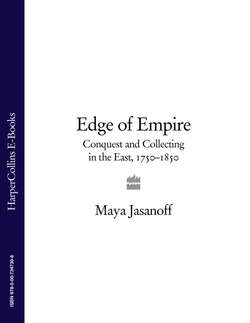Читать книгу Edge of Empire: Conquest and Collecting in the East 1750–1850 - Maya Jasanoff, Maya Jasanoff - Страница 15
ОглавлениеCHAPTER THREE Compromises
I. Going Un-Native
As the monsoon rains sheeted down over Lucknow in 1786, Antoine Polier wrote to his benefactor, Warren Hastings, with a surprising and wonderful piece of news. For ten years Asaf ud-Daula had been in Polier’s debt, owing him loans and interest payments amounting to the staggering sum of twentyseven lakhs—about £270,000 then, at least £20 million today.1 Polier had been waiting for so long he must scarcely have believed he would ever be paid. But now, he informed his patron, “in consequence of the arrangements, you took when last with us, and your recommendations in my favour, I have already received a considerable part of my debt from the Vizier, and am in a fair way of realizing the whole before November next, if no sinister accident intervenes.” The money was Polier’s ticket home. “I am now enabled by this event to follow my inclination, which has long pointed out to me a trip to England, as a thing of absolute necessity; I therefore intend, God willing, to quit this Country by one of the early ships of this season…” This would mean a hurried departure, just a few months later, “but having it now in my power to retire,” he concluded, “I should think myself deserving of all the ills I have suffered and do still suffer was I any longer to remain as I am.”2 Thus Antoine Polier, Arsalan-i Jang, prepared to return to Europe, after an absence of thirty years. Little did he know that he was soon to suffer the cruelest truth of empire: you could never go home again.
How long would cosmopolitan Lucknow survive? Only as long as Polier’s generation of border crossers and collectors remained there. For if entrepreneurial Europeans had discovered in Lucknow the chance to make money, to span cultural borders, to collect, and to reinvent themselves, leaving Lucknow threatened to break their fusions catastrophically apart. Even Polier must have known that his departure for Europe would have serious consequences for his cross-cultural household. What he could not know was that it would also test the limits of his European identity in a dramatic and quite unpredictable way. And his experience was not unique. A foil to Polier’s predicament would be provided by Benoît de Boigne, one of his and Claude Martin’s closest friends. De Boigne, a Savoyard, was another Francophone European in British and Indian service, and a sometime denizen of Lucknow. An active soldier, he spent too much time in the field to immerse himself in Lucknow the way Polier and Martin had; but he, too, made his Indian home there, with his beloved Muslim wife and their children. Like Polier and Martin, he also was a collector, recording his Indian life in objects. For both him and Polier, choices about when, where, with what, and with whom to leave Lucknow would yank the foundations out from under a delicate assemblage of European loyalties and Indian commitments.
The obvious question, of course, was why—given the depth of their Indian attachments—such figures opted to leave at all. Indeed, Polier had several times risked unemployment and Company disapproval in order to stay in Lucknow. But dreams of return were usually what had lured officers and civil servants to India in the first place: the dream of returning richer, more secure, better established, than they had left. To be sure, the rampant fortuneering of the Clive era was less and less common. By the late 1780s, under the administration of Lord Cornwallis, Company servants were not allowed either to accept “gifts” or to engage in private trade. (Awadh and Hyderabad were such appealing postings partly because it was easier to skirt those regulations.) Still, even the midranking soldier Richard Plowden returned to Britain £33,000 richer than he had departed—in today’s terms, he was a millionaire several times over—bought a stylish London house, frequented distinguished circles, and set up all four of his sons as East India Company writers, or junior clerks.3 The East was becoming a career.
Few, of course, would be so lucky. The vast majority of the forty thousand or so Europeans in India by 1800 were enlisted soldiers with limited chances of returning to Europe: one in four would die in India.4 A walk among the moss-caked obelisks and mausolea of Calcutta’s Park Street Cemetery impresses one with the scale of civilian loss. These monuments are huge, as if sheer mass of bricks and mortar could stand in for lives ended too young, “on distant shores from Kindred dust removed.” They are also insistent. this is lawrence gall’s tomb, pronounces one: it was thy fate, o gall, to live long enough to see thyself neglected by those friends who ought to have served thee. to thee and thine fortune has been unkind. Another epitaph summarizes the life of Richard Becher, who had actually made it out of Bengal once alive, in 1771, returning to Britain a successful nabob; but he met ruin in London, and traveled once more to Calcutta, where under the pang of disappointment and the pressure of the climate, a worn mind and debilitated body sunk to rest. He died in 1782. What also comes through so poignantly is how many of those who returned to Britain were emotional survivors, too, leaving loved ones beneath Indian soil. Becher had already buried his wife, Charlotte, in the graveyard of St. John’s Church, who died after suffering with patience a long illness occasioned by grief for the death of an only daughter. Poor Philip Hunt had three graves to tend: in 1801 he lost his twenty-one-year-old wife Harriet, only to be bereaved again just three years later, with the deaths of his second wife and his infant son. her ways were ways of pleasantness, /and all her paths were peace.5
